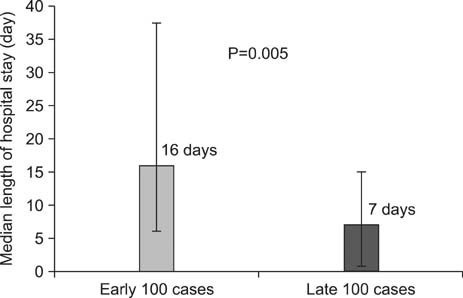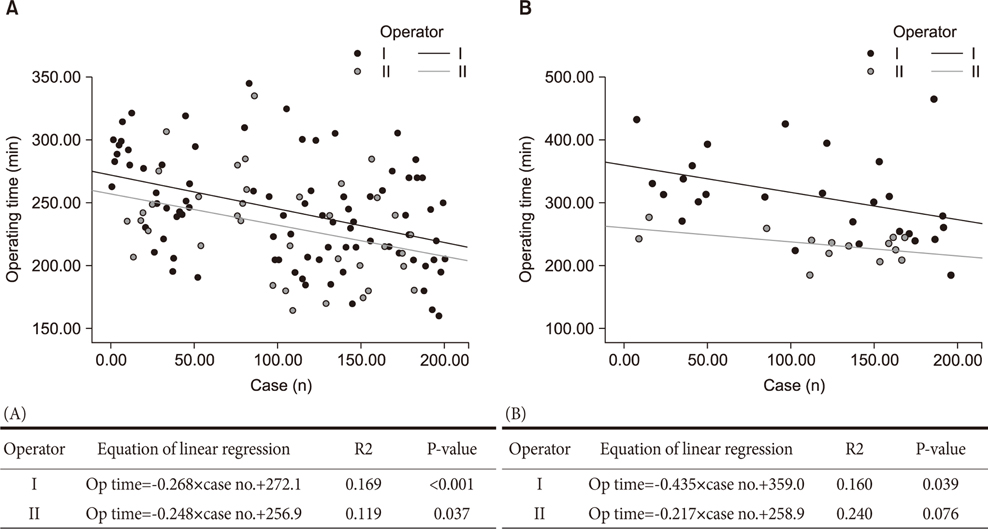J Gastric Cancer.
2013 Dec;13(4):255-262.
Emerging Role of Robot-assisted Gastrectomy: Analysis of Consecutive 200 Cases
- Affiliations
-
- 1Gastric Cancer Branch, Research Institute and Hospital, National Cancer Center, Goyang, Korea. gskim@ncc.re.kr
- 2Department of Surgery, Klinikum Rechts der Isar der Technischen Universitat Munchen, Munich, Germany.
Abstract
- PURPOSE
Robotic surgery for gastric cancer is a promising alternative to laparoscopic surgery, but the data are limited. We aimed to evaluate whether gaining experience in robotic gastrectomy could improve surgical outcomes in the treatment of gastric cancer.
MATERIALS AND METHODS
Two hundred and seven consecutive cases of patients with clinical stage I gastric cancer who underwent robotic surgery at the National Cancer Center of Korea between February 2009 and February 2012 were retrospectively reviewed. Surgical outcomes were analyzed and compared between the initial 100 and later 100 cases.
RESULTS
Seven patients required conversion to open surgery and were excluded from further analysis. The mean operating time for all patients was 248.8 minutes, and mean length of hospitalization was 8.0 days. Twenty patients developed postoperative complications. Thirteen were managed conservatively, while 6 had major complications requiring invasive procedures. One mortality occurred owing to myocardial infarction. Operating time was significantly shorter in the latter 100 cases than in the initial 100 cases (269.9 versus 233.5 minutes, P<0.001). The number of retrieved lymph nodes was significantly greater in the latter cases (35.9 versus 39.9, P=0.032). The hospital stay of patients with complications was significantly longer in the initial cases than in the latter cases (16 versus 7 days, P=0.005).
CONCLUSIONS
Increased experience with the robotic procedure for gastric cancer was associated with improved outcomes, especially in operating time, lymph node retrieval, and shortened hospital stay of complicated patients. Further development of surgical techniques and technology might enhance the role of robotic surgery for gastric cancer.
MeSH Terms
Figure
Reference
-
1. Song J, Kang WH, Oh SJ, Hyung WJ, Choi SH, Noh SH. Role of robotic gastrectomy using da Vinci system compared with laparoscopic gastrectomy: initial experience of 20 consecutive cases. Surg Endosc. 2009; 23:1204–1211.
Article2. Kitano S, Shiraishi N, Uyama I, Sugihara K, Tanigawa N. Japanese Laparoscopic Surgery Study Group. A multicenter study on oncologic outcome of laparoscopic gastrectomy for early cancer in Japan. Ann Surg. 2007; 245:68–72.
Article3. Huscher CG, Mingoli A, Sgarzini G, Sansonetti A, Di Paola M, Recher A, et al. Laparoscopic versus open subtotal gastrectomy for distal gastric cancer: five-year results of a randomized prospective trial. Ann Surg. 2005; 241:232–237.
Article4. Noshiro H, Shimizu S, Nagai E, Ohuchida K, Tanaka M. Laparoscopy-assisted distal gastrectomy for early gastric cancer: is it beneficial for patients of heavier weight? Ann Surg. 2003; 238:680–685.5. Kim YW, Baik YH, Yun YH, Nam BH, Kim DH, Choi IJ, et al. Improved quality of life outcomes after laparoscopy-assisted distal gastrectomy for early gastric cancer: results of a prospective randomized clinical trial. Ann Surg. 2008; 248:721–727.
Article6. Eom BW, Yoon HM, Ryu KW, Lee JH, Cho SJ, Lee JY, et al. Comparison of surgical performance and short-term clinical outcomes between laparoscopic and robotic surgery in distal gastric cancer. Eur J Surg Oncol. 2012; 38:57–63.
Article7. Woo Y, Hyung WJ, Pak KH, Inaba K, Obama K, Choi SH, et al. Robotic gastrectomy as an oncologically sound alternative to laparoscopic resections for the treatment of early-stage gastric cancers. Arch Surg. 2011; 146:1086–1092.
Article8. Yoon HM, Kim YW, Lee JH, Ryu KW, Eom BW, Park JY, et al. Robot-assisted total gastrectomy is comparable with laparoscopically assisted total gastrectomy for early gastric cancer. Surg Endosc. 2012; 26:1377–1381.
Article9. Lee SE, Kim YW, Lee JH, Ryu KW, Cho SJ, Lee JY, et al. Developing an institutional protocol guideline for laparoscopy-assisted distal gastrectomy. Ann Surg Oncol. 2009; 16:2231–2236.
Article10. Strasberg SM, Linehan DC, Hawkins WG. The accordion severity grading system of surgical complications. Ann Surg. 2009; 250:177–186.
Article11. Washington K. 7th edition of the AJCC cancer staging manual: stomach. Ann Surg Oncol. 2010; 17:3077–3079.
Article12. Marano A, Hyung WJ. Robotic gastrectomy: the current state of the art. J Gastric Cancer. 2012; 12:63–72.
Article13. Isogaki J, Haruta S, Man-I M, Suda K, Kawamura Y, Yoshimura F, et al. Robot-assisted surgery for gastric cancer: experience at our institute. Pathobiology. 2011; 78:328–333.14. Hur H, Kim JY, Cho YK, Han SU. Technical feasibility of robot-sewn anastomosis in robotic surgery for gastric cancer. J Laparoendosc Adv Surg Tech A. 2010; 20:693–697.
Article15. Uyama I, Kanaya S, Ishida Y, Inaba K, Suda K, Satoh S. Novel integrated robotic approach for suprapancreatic D2 nodal dissection for treating gastric cancer: technique and initial experience. World J Surg. 2012; 36:331–337.
Article16. Anderson C, Ellenhorn J, Hellan M, Pigazzi A. Pilot series of robot-assisted laparoscopic subtotal gastrectomy with extended lymphadenectomy for gastric cancer. Surg Endosc. 2007; 21:1662–1666.
Article17. Kim HH, Hyung WJ, Cho GS, Kim MC, Han SU, Kim W, et al. Morbidity and mortality of laparoscopic gastrectomy versus open gastrectomy for gastric cancer: an interim report--a phase III multicenter, prospective, randomized Trial (KLASS Trial). Ann Surg. 2010; 251:417–420.
Article18. Park JY, Jo MJ, Nam BH, Kim Y, Eom BW, Yoon HM, et al. Surgical stress after robot-assisted distal gastrectomy and its economic implications. Br J Surg. 2012; 99:1554–1561.
Article19. Kang BH, Xuan Y, Hur H, Ahn CW, Cho YK, Han SU. Comparison of surgical outcomes between robotic and laparoscopic gastrectomy for gastric cancer: the learning curve of robotic surgery. J Gastric Cancer. 2012; 12:156–163.
Article20. Caruso S, Patriti A, Marrelli D, Ceccarelli G, Ceribelli C, Roviello F, et al. Open vs robot-assisted laparoscopic gastric resection with D2 lymph node dissection for adenocarcinoma: a case-control study. Int J Med Robot. 2011; 7:452–458.
Article21. D'Annibale A, Pende V, Pernazza G, Monsellato I, Mazzocchi P, Lucandri G, et al. Full robotic gastrectomy with extended (D2) lymphadenectomy for gastric cancer: surgical technique and preliminary results. J Surg Res. 2011; 166:e113–e120.22. Lee HH, Hur H, Jung H, Jeon HM, Park CH, Song KY. Robot-assisted distal gastrectomy for gastric cancer: initial experience. Am J Surg. 2011; 201:841–845.
Article23. Patriti A, Ceccarelli G, Bellochi R, Bartoli A, Spaziani A, Di Zitti L, et al. Robot-assisted laparoscopic total and partial gastric resection with D2 lymph node dissection for adenocarcinoma. Surg Endosc. 2008; 22:2753–2760.
Article24. Huang KH, Lan YT, Fang WL, Chen JH, Lo SS, Hsieh MC, et al. Initial experience of robotic gastrectomy and comparison with open and laparoscopic gastrectomy for gastric cancer. J Gastrointest Surg. 2012; 16:1303–1310.
Article25. Heemskerk J, van Gemert WG, de Vries J, Greve J, Bouvy ND. Learning curves of robot-assisted laparoscopic surgery compared with conventional laparoscopic surgery: an experimental study evaluating skill acquisition of robot-assisted laparoscopic tasks compared with conventional laparoscopic tasks in inexperienced users. Surg Laparosc Endosc Percutan Tech. 2007; 17:171–174.
Article26. Jansen EP, Boot H, van de Velde CJ, van San dick J, Cats A, Verheij M. Can adjuvant chemoradiotherapy replace extended lymph node dissection in gastric cancer? Recent Results Cancer Res. 2012; 196:229–240.
Article27. Brisinda G, Crocco A, Tomaiuolo P, Santullo F, Mazzari A, Vanella S. Extended or limited lymph node dissection? A gastric cancer surgical dilemma. Ann Surg. 2012; 256:e30–e31.
Article
- Full Text Links
- Actions
-
Cited
- CITED
-
- Close
- Share
- Similar articles
-
- Is Minimally Invasive Gastrectomy Feasible for the Treatment of Multiple Early Gastric Cancer?
- A Review of Robot-Assisted Gait Training in Stroke Patients
- Cardiac arrest with pulseless electrical activity during a robot-assisted distal gastrectomy: A case report
- Concurrent Robot-Assisted Distal Gastrectomy and Partial Nephrectomy for Synchronous Early Gastric Cancer and Renal Cell Carcinoma: An Initial Experience
- Robot-assisted distal gastrectomy for gastric cancer in a situs inversus totalis patient



